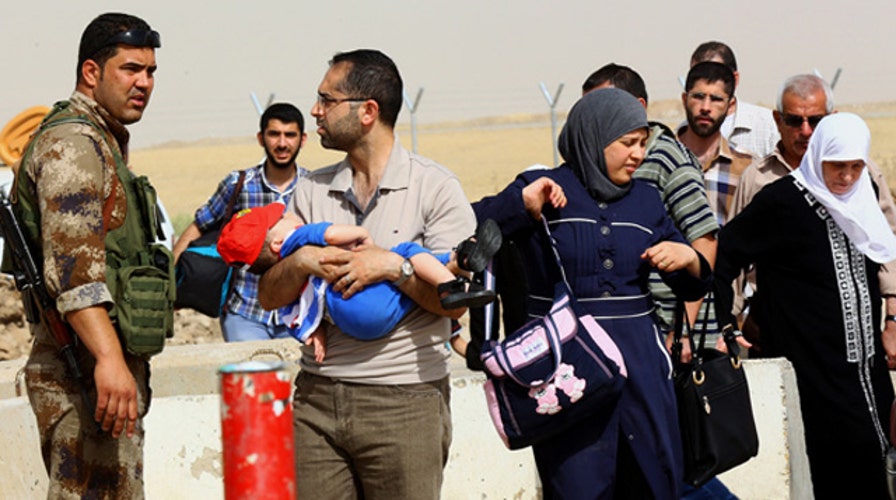Jonathan Rugman offers insight into lives of Iraqi refugees
Journalist discusses the possible rescue mission
The United Nations announced it had declared the humanitarian crisis in Iraq to be the highest level of emergency, while clashes between Iraqi troops and Sunni militants west of Baghdad killed at least four children Thursday.
The U.N. on Wednesday declared the situation in Iraq a "Level 3 Emergency" -- a development that will trigger additional goods, funds and assets to respond to the needs of the displaced, said U.N. special representative Nickolay Mladenov, pointing to the "scale and complexity of the current humanitarian catastrophe."
The U.N. Security Council also said it was backing a newly nominated premier-designate in the hope that he can swiftly form an "inclusive government" that could counter the insurgent threat, which has plunged Iraq into its worst crisis since the U.S. troop withdrawal in 2011.
Since sweeping across northern and western Iraq from its base in Syria in early June, the Islamic State militant group, formerly known as ISIS, has driven hundreds of thousands from their homes. Among those who have been displaced are the minority Christian and Yazidi religious communities, while the militants have also threatened Iraqi Kurds in the Kurdish autonomous region in the north.
Tens of thousands of Yazidis have fled the Islamic State group's advance to take refuge in the remote desert Sinjar mountain range.
The U.S. and Iraqi military have dropped food and water supplies, and in recent days Kurds from neighboring Syria battled to open a corridor to the mountain, allowing some 45,000 to escape.
Two U.S. officials told The Associated Press Thursday that roughly 4,500 people remain atop the mountain, and nearly half are herders who lived there before the siege and have no interest in being evacuated.
The officials spoke on condition of anonymity because they weren't authorized to speak publicly.
As for the Yazidis who remain on the mountain, Pentagon Press Secretary Rear Admiral John Kirby said late Wednesday that a team of military personnel had "assessed that there are far fewer Yazidis there than previously feared" and those who remain are "in better condition than previously believed and continue to have access to the food and water we dropped."
As a result, Kirby said, officials had "determined that an evacuation mission is far less likely."
The U.N. said it would provide increased support to those who have escaped Sinjar and to 400,000 other Iraqis who have fled since June to the Kurdish province of Dahuk. Others have fled to other parts of the Kurdish region or further south.
A total of 1.5 million have been displaced by the fighting since the insurgents captured Iraq's second-largest city, Mosul, in June and quickly swept over other parts of the country.
Fighting erupted early on Thursday in the militant-held city of Fallujah, about 40 miles west of Baghdad. The clashes on the city's northern outskirts killed four children, along with a woman and at least 10 militants, said Fallujah hospital director Ahmed Shami. He had no further details on clashes, beyond saying that four other children and another woman were wounded in the violence.
It was difficult to gauge the situation in Fallujah, which has been in the hands of the Islamic State since early January, when the militants seized much of the Western Anbar province along with parts of the provincial capital of Ramadi.
The United States has been carrying out airstrikes in recent days against Islamic State fighters, helping fend back their advance on Kurdish regions.
Meanwhile, Iraq's central government in Baghdad continued to be mired in political turmoil, after the president nominated a Shiite politician, Haider al-Abadi, to form the next government, putting him on track to replace embattled Prime Minister Nouri al-Maliki.
Al-Maliki on Wednesday said he will not relinquish power until a federal court rules on what he called a "constitutional violation" by President Fouad Massoum.
Al-Maliki insists he should have a third term in office but he is appearing increasingly isolated as the international community lines up behind al-Abadi, who has 30 days to come up with a proposal for a Cabinet.
The U.N. Security Council urged al-Abadi to work swiftly to form "an inclusive government that represents all segments of the Iraqi population and that contributes to finding a viable and sustainable solution to the country's current challenges."
In Morocco, police dismantled a nine-person cell recruiting volunteers to fight with Islamic State in Syria and Iraq, the Interior Ministry said in a statement Thursday.
The network was operating in the Mediterranean city of Tetouan, Fez and Fnideq, a small town near the Spanish enclave of Ceuta, raising funds and sending people to Syria and Iraq, the police said. A statement from the Spanish Interior Ministry, which was involved in the investigation, said the network also operated in its North African enclave of Ceuta.
While Morocco has experienced few terrorist attacks, it has become a fertile recruiting ground for jihadi networks, sending fighters to places like Syria and Mali with authorities finding new cells every few months.
The Associated Press contributed to this report.

